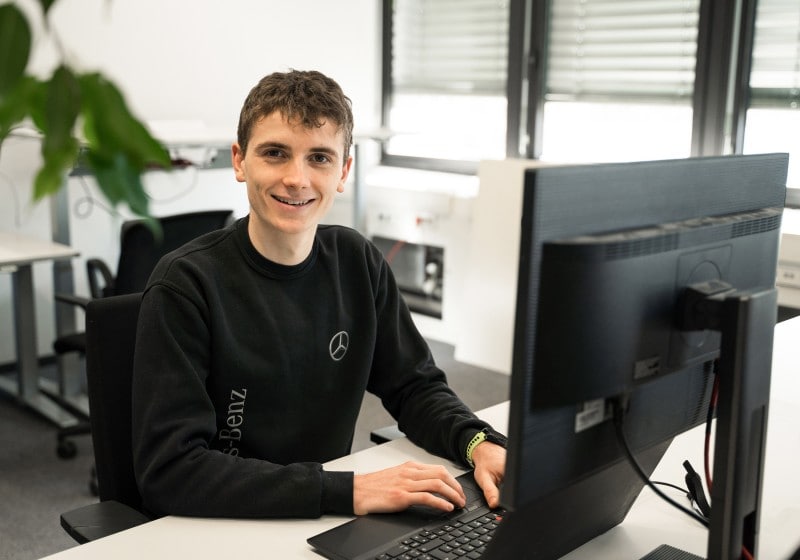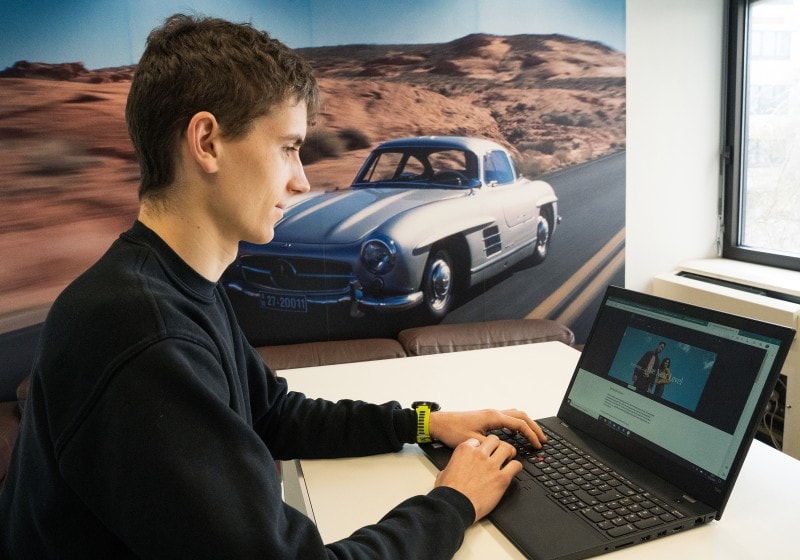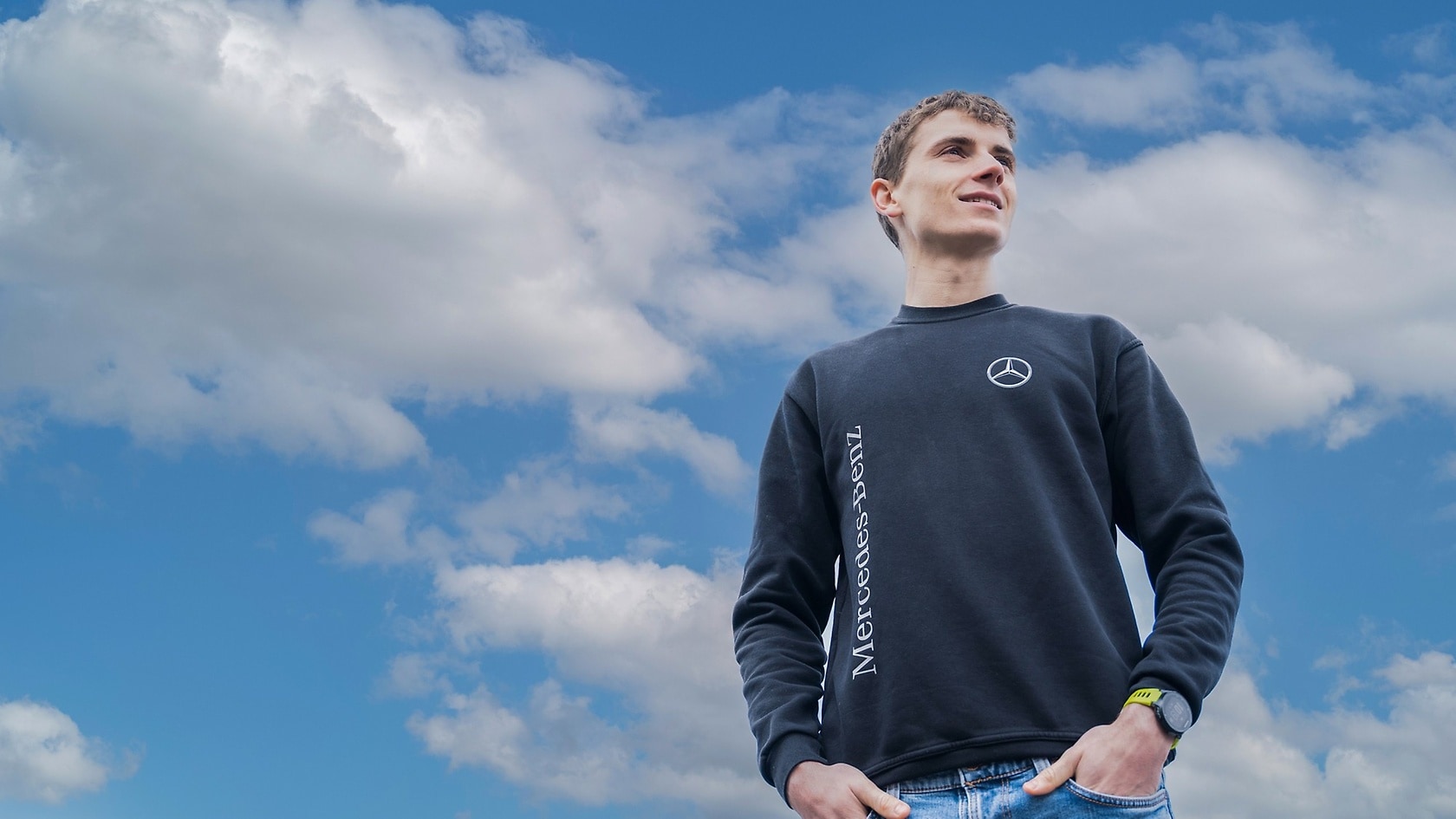With a dual study programme on the pulse of transformation.
As a dual student of electrical engineering and on-board electronics with a focus on embedded IT, Alexander Köhn has already gained extensive insight into research & development at Mercedes-Benz. The Baden-Wuerttemberg Cooperative State University (DHBW) has given him the chance to apply his knowledge by working on projects like optimising an autonomous driving racing car. In his interview, Alexander explains why he feels at home at Mercedes-Benz in the "Champions League of software programming" and what personal goal he is nine seconds from achieving.
Alexander, as a third-year electrical engineering/on-board electronics dual student, you are currently part of the "Egomotion" team in the Development unit. What does "egomotion" actually mean?
Egomotion is an element of automated driving and refers to the use of sensors to calculate the movement of a vehicle. An automated driving vehicle is equipped with cameras, radars, and lidars, which are a type of laser scanner that measure distances, all of which act as the car's eyes and "see" where the drive is headed. If a camera were to malfunction for a short time, the egomotion would take over this "seeing" function. In order to know where we are at any given time, GPS sensors are used, much like a person's sense of direction. In the event that the GPS signal does not work for a short time, the Egomotion takes over the "orientation". It calculates the vehicle's own movement and its position in relation to the space around it using measurement data from various sensors. You might compare this to what it is like for us humans to turn around with our eyes closed. When this happens, it feels like we are moving in space without actually seeing it.

That sounds exciting. How long do you usually stay with one team?
Either three or six months, depending on which stage you are at as a student. I'm here for three months now, but I'll be coming back in the summer to write my bachelor's thesis. This is because I really like it here, I think my bachelor's topic will focus on egomotion, most likely concentrating on error monitoring and detection via sensors.
What are you currently working on during your placement?
Right now I'm overseeing a project of my own. Egomotion is implemented as a complex software package within the vehicle, and we want to integrate new analytical tools into it. I am currently programming an interface for this. This will also be relevant for later developments in terms of testing software.
What has been your highlight so far as a dual student at Mercedes-Benz?
Last year, I spent some time in the Research unit doing a practical assignment on topics that will perhaps be ready for series production in ten years' time. This helped me enormously in looking at things with a different mindset. Since then, I have tended to approach technical topics more holistically and have a better understanding of what's behind them – even in the context of electrification, digitalisation, and automated driving. I was able to work on a research prototype where I assessed the maturity level of components with other departments. I was also given the freedom to work on different kinds of inventions with my supervisor. We recently received the news that one of our inventions is being filed as a patent.
Congratulations! In the first year, you managed to develop a massage seat that uses new technology, and you did this as part of an independent team of students. Were you expecting to become an inventor right at the beginning of your studies?
Not really. The development of the massage seat was a challenging task we were given in the Research unit. I had just finished my second semester, so I hardly had any experience. There were eight of us working on the project, and none of us expected it to work so well because we only had a month to finish it. We programmed our own control units, created a printed circuit board, had it manufactured, and then soldered and assembled it ourselves. Everyone brought their own strengths to the table and oversaw a particular area. The seat is still working perfectly two years on.

It is not only at Mercedes-Benz – you have also been working on automated driving at your university. What are you currently working on there?
Together with a colleague, I am working on the sensor merger of a camera and lidar as part of the Formula Student team. Formula Student is an international design competition for students, where teams compete against each other in self-built racing cars. There are racing cars with combustion engines and with electric motors, as well as cars that drive completely autonomously. We are currently working on a sub-function for the autonomous racing car. We are trying to implement a new method of combining the sensor information from the camera and lidar in order to obtain improved image information. We are doing this as a student research project over the course of two semesters.
Who or what influenced your choice of studies?
It was definitely my interest in cars! I've always been fascinated by how cars work. I was good at maths and physics at school, but I never really understood simple electrical theory. However, I really wanted to get to grips with it, which ultimately sparked my interest in electrical engineering: How does an engine, transmission, or a steering system work? And what happens technically when I trigger the windscreen wipers to move via the windscreen wiper lever? I wanted to get to the bottom of how a vehicle is networked as well as how it is controlled and regulated.
How would you describe working with colleagues at Mercedes-Benz?
I've found them to be very supportive. For example, when I join a department, I am quickly included in their team meetings and invited to team events. I am happy to help other employees in areas that I know very well, and, vice versa, they help me in areas where I lack expertise. In my current team, the make-up is particularly interesting because it is very international and works in an agile way. For example, we have a colleague from India supporting the team in the series project. I also take part in the meetings concerning current series development and, as a newcomer, I feel able to ask critical questions at any time. For me, it is particularly fulfilling that my project is of relevance to the team and challenges me on a daily basis.
You are finishing your studies this year and plan to apply for a job. Is there any one unit that you find particularly appealing?
I am definitely drawn to the Automated Driving development unit. For me, it's simply the "Champions League" of software programming, as one of my colleagues once put it. So much is possible in the software environment, but automated driving is especially complex. But I also find other units very exciting. For example, the Production and Development of the electric drive.
What advice do you have for school graduates who want to apply for a dual study programme?
Don't be afraid to give things a try, even if you think that you can`t do them yet and you might believe "I can't do that or I won't learn that anyway!" I find myself thinking like this quite often when it comes to programming, for example. It's only when you get into it that you realise that you can do it after all. This has also been the case during my practical stages: So far, I've never been sure at the beginning whether I have one hundred per cent understood what it's all about and whether it's going to work out in the end. But that's when you learn the most. The same applies to studying – you have to take a chance if you want to succeed.
In your free time you are very active in sports, especially as a long-distance track and field athlete. What do you get out of running?
It gives me an inner balance and strengthens my self-esteem when I achieve certain times. My main distances are 5,000 and 10,000 metres. Reaching magical milestones like clocking 15 minutes for 5,000 metres or beating your competitors is an incredible feeling. This is really motivates me in training. I desperately want to run under 15 minutes – I'm still nine seconds short of that.
Is there a particular race you would like to take part in?
My personal dream is to wear the German national strip and to take part in a European Championship for Germany – it doesn't matter where. At the moment, this is highly improbable, but this vision is what drives me. I have been running for eight years and participated twice in German championships in my youth. The next step will be to compete in the senior men's category. You need specific times to qualify for that, something I'm currently still a long way from achieving.
During his youth in Roth near Nuremberg, the sporty Mercedes SLS AMG model was Alexander's favourite. These days, he would prefer to drive a C-Class AMG Wagon, but with trailer coupling so that he can easily take his racing bike along for trips. That's why Mercedes-Benz was his employer of choice for the dual study programme, which he is completing at DHBW Ravensburg. For eight years, running has been one of his passions, which takes him up to 20 kilometres through the forest or along the local canal. As a track and field C coach in competitive sports, he not only coaches triathletes, but has also prepared many of his colleagues for the company run by holding a monthly workshop. Something that the dual study programme has taught him beyond all the specialist knowledge is the art of relocating effectively: For his temporary moves between the campus in Friedrichshafen and the practical assignments in Stuttgart-Vaihingen, Alexander now needs only one car load instead of two.




